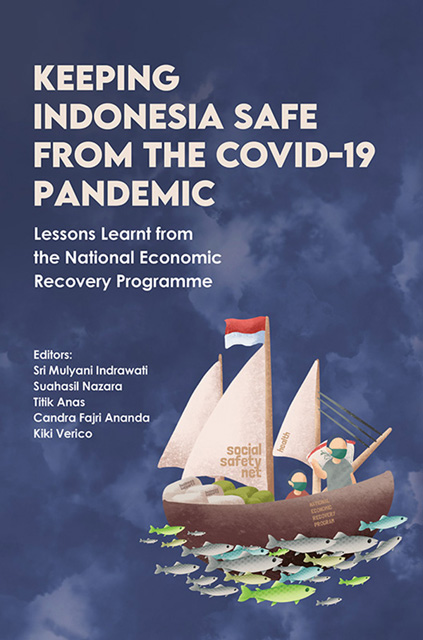 Keeping Indonesia Safe from the COVID-19 Pandemic
Keeping Indonesia Safe from the COVID-19 Pandemic Published online by Cambridge University Press: 30 June 2023
INTRODUCTION
The impact of COVID-19 on the economy is more severe than the 2008 global economic crisis that was felt by many countries in the world because the global economic crisis was mainly related to the global financial crisis and mostly felt by developed countries, while the economic crisis due to the COVID-19 pandemic is a health crisis that crippled the economy and felt by all countries, and not a single country was free from the COVID-19 pandemic. The crisis caused by the pandemic is also the first experience in the modern era and it needs extraordinary policies that had never been implemented before. The rapid spread of the COVID-19 virus globally in 2020 negatively impacted the world's economy, including Indonesia. Implementation of government policies to restrict mobility and direct interaction among the population has a significant impact on the decline of economic and social activities. In 2020, the world economy contracted by 3.1 per cent, in which the economies of developed countries recorded a larger contraction of 4.5 per cent than the emerging market and developing economies which experienced a decline of 2.1 per cent (IMF 2021). Meanwhile, the Indonesian economy also contracted by 2.1 per cent lower than the rate at which the global economy declines (BPS 2021). When looking at economic growth on quarterly bases, economic growth in the first quarter of 2020 was only 3.0 per cent, lower than an average yearon- year (YoY) growth of 5.0 per cent. This was followed by consecutive contractions of –5.3 per cent in Q2 2020, –3.5 per cent in Q3 2020 and –2.2 per cent in Q4 2020. Those declines indicated that the Indonesian economy fell into recession.
The COVID-19 pandemic had a detrimental effect on Indonesia's economy, not only at the national level but also at the regional level. This was shown by slowing economic growth, increasing unemployment and poverty in almost all provinces. However, the diverse characteristics of regions in Indonesia create regional dynamics where the impact of the pandemic on the regional economy is not symmetrical. For instance, Bali, which is highly dependent on the tourism sector, was most significantly affected by the COVID-19 pandemic.
To save this book to your Kindle, first ensure [email protected] is added to your Approved Personal Document E-mail List under your Personal Document Settings on the Manage Your Content and Devices page of your Amazon account. Then enter the ‘name’ part of your Kindle email address below. Find out more about saving to your Kindle.
Note you can select to save to either the @free.kindle.com or @kindle.com variations. ‘@free.kindle.com’ emails are free but can only be saved to your device when it is connected to wi-fi. ‘@kindle.com’ emails can be delivered even when you are not connected to wi-fi, but note that service fees apply.
Find out more about the Kindle Personal Document Service.
To save content items to your account, please confirm that you agree to abide by our usage policies. If this is the first time you use this feature, you will be asked to authorise Cambridge Core to connect with your account. Find out more about saving content to Dropbox.
To save content items to your account, please confirm that you agree to abide by our usage policies. If this is the first time you use this feature, you will be asked to authorise Cambridge Core to connect with your account. Find out more about saving content to Google Drive.